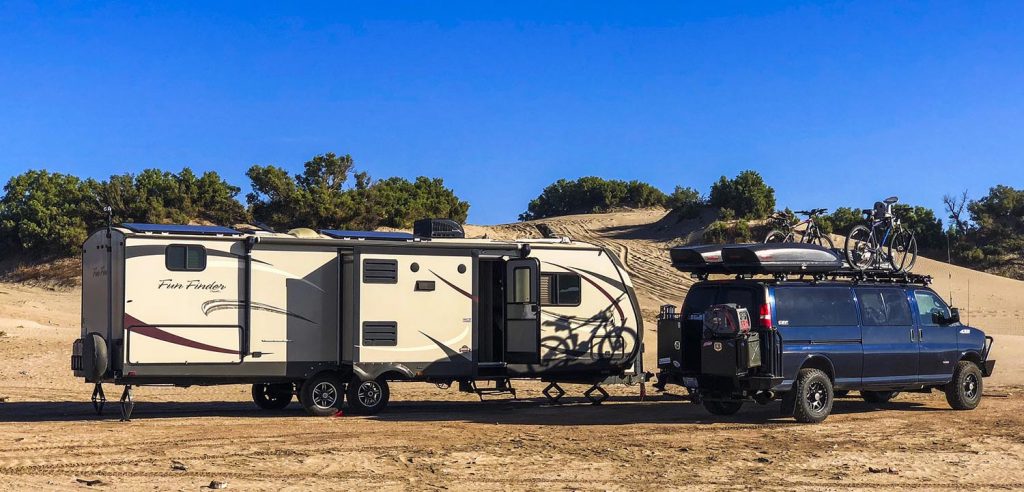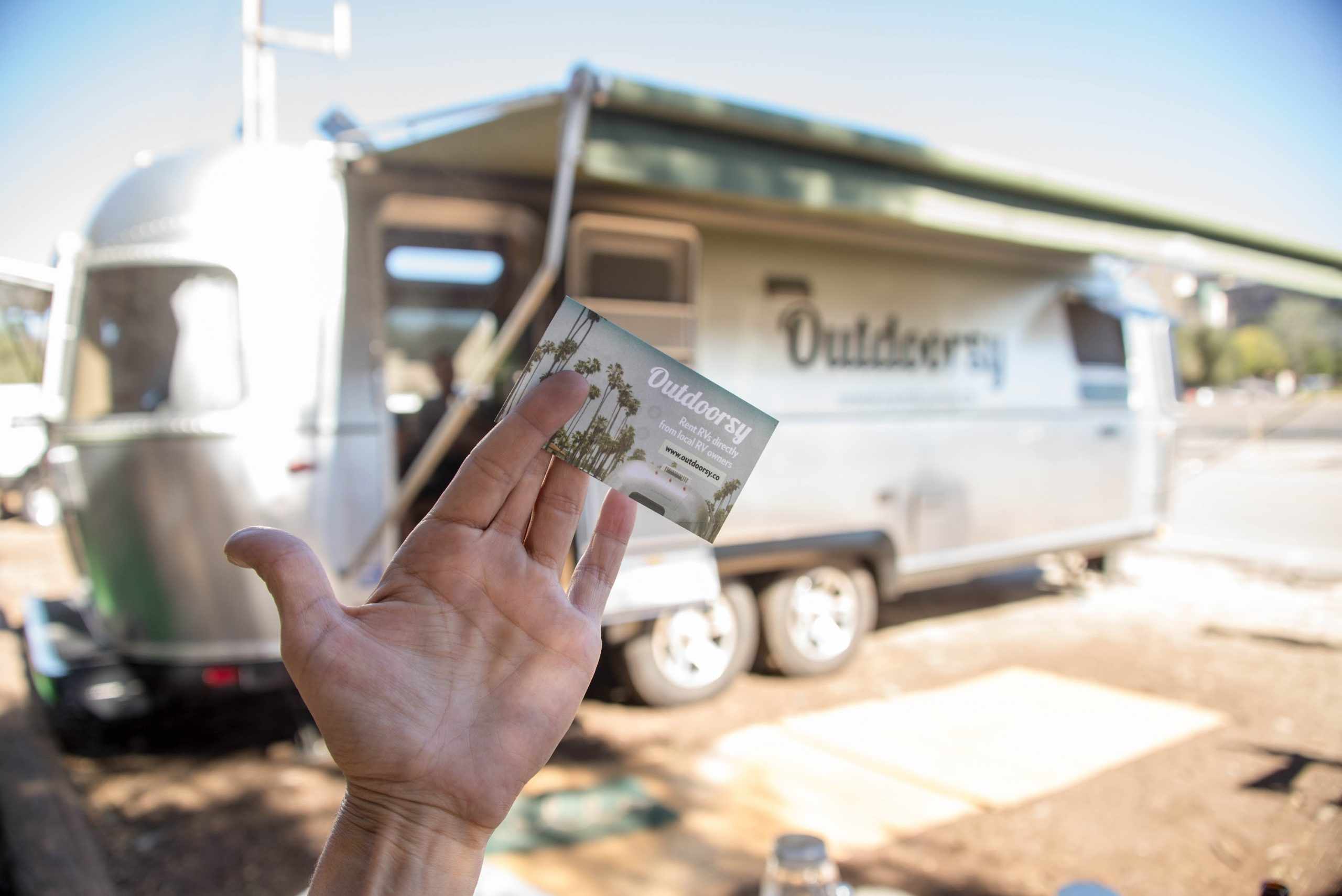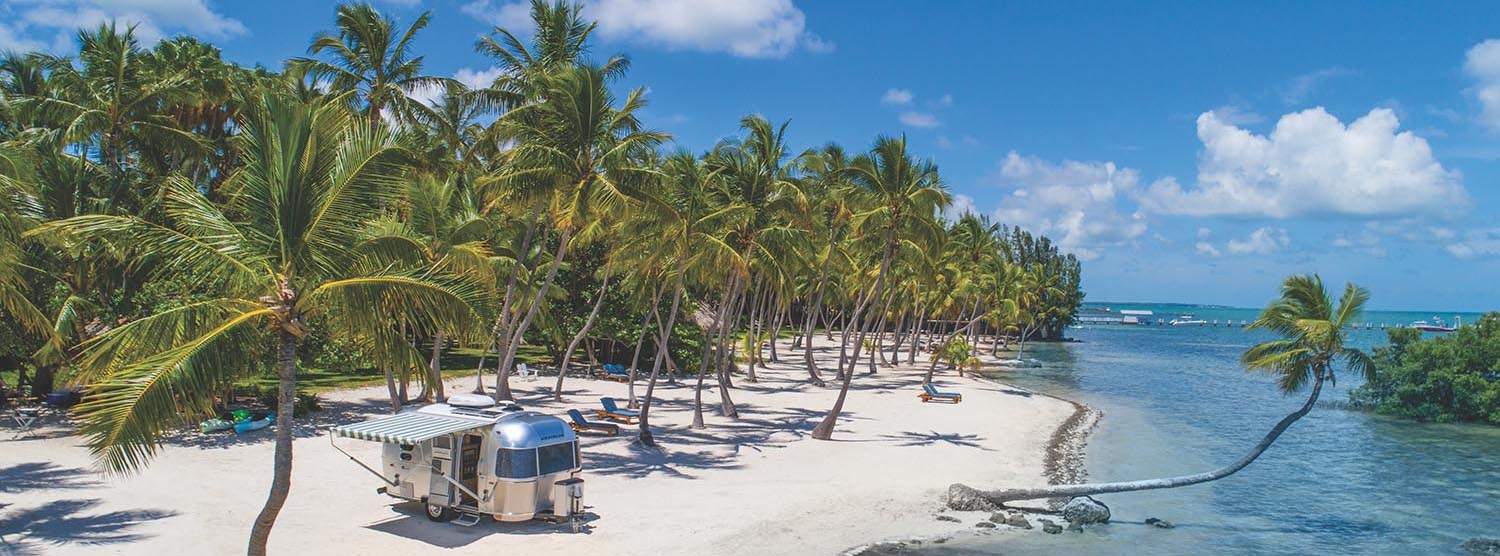There are so many RV options that it can be hard to choose! Pull-behind travel trailers and fifth wheels are two popular choices that allow you to pull an RV using your own vehicle. But not all cars, trucks, and SUVs are up for the task. If you are considering using a towing car to get your rig to your vacation destination, listen up! Here’s a quick guide to help you decide which trailer your car can tow.
What You Need to Know About Towing a Trailer
Here are the first steps in determining whether or not you car can handle a pull-behind trailer on a road trip.
RV Car Towing Equipment
First thing first— if you’re going to tow, you’re going to need the right equipment. This means your vehicle will need a hitch. If your vehicle doesn’t have a trailer hitch installed already, you’ll need to get that done. For those who are mechanically inclined, hitch installations can be a DIY project. Otherwise, it may be a job best left to the professionals. Here’s a basic DIY explainer video from O’Reilly Auto Parts.
The whole hitch system includes parts like the receiver tube, hitch pin, ball mount, safety chain, and wiring harness. If your car, truck, or SUV already has one installed— great! Your next step is to see if your vehicle can handle the load. If your vehicle doesn’t have a trailer hitch installed already, you’ll need to get that done.
Towing a Fifth Wheel
Fifth wheels are a little bit different than your average bumper pull RV. A pickup truck is essential to pull a fifth wheel, and the truck will need a special fifth wheel hitch in the bed. Even with all of that equipment, you will need to know a few things about your truck.

Towing Terms to Know
A pull-behind trailer of any size requires knowledge about the vehicle that will be towing it down the road. You should familiarize yourself with the following terms:
- Gross vehicle weight (GVW): The total weight of your car or truck, including passengers
- Gross vehicle weight rating (GVWR): This is how much weight your vehicle can tow. The GVWR is usually found on the sticker in the driver’s side door frame. You can also find it in the owner’s manual or from the manufacturer.
- Vehicle torque: This number indicates how well your vehicle can pull at low speeds
- Trailer hitch towing capacity: Hitches come in five classes with different ball receiver sizes
-
- I – rated up to 2,000 lbs. with 1-1/4” receiver
- II – rated up to 3,500 lbs. with 1-1/4” receiver
- III – rated up to 6,000 lbs. with 2” receiver
- IV – rated up to 10,000 lbs. with 2” receiver
- V – rated up to 12,000 lbs. with 2-1/2” receiver
Most of the above items can usually be found on the sticker in the driver’s side door frame. You can also find it in the owner’s manual or from the manufacturer.
Once you’ve determined the GVWR of your tow vehicle, multiply that number by 80%. The resulting weight is how much your trailer can weigh when it is fully loaded with water, propane, and all of your stuff.

Then look at the amount of torque your engine has. If the number is low, you will not have much pulling power. This number also figures into your vehicle’s GVWR – hence the amount of weight you can safely pull is low, as well.
Take a look at the hitch rating on your vehicle. That, too, will narrow your trailer selection by the weight that you can safely pull.
Calculating Your Vehicle’s Towing Capacity
Here’s an example of the above-mentioned selection process:
- Tow vehicle is 2018 Ford Explorer
- GVWR is 6,160 lbs.
- 6,160 x 80% = 4,928 lbs.
- The hitch is Class 3 rated up to 6,000 lbs.
- A fully loaded trailer cannot weigh more than 4,928 lbs.
Using this example, narrow your trailer shopping focus to those weighing less than 4,928 lbs. loaded. (Remember, water weighs about 8 lbs. per gallon. If you have a 40-gallon water tank, 30-gallon gray tank, and a 30-gallon black tank and all the tanks were full, that is 800 lbs. of liquid to subtract from your total weight. That alone will bring the loaded weight of your trailer down to 4,100 lbs. even though you might not have full tanks all the time – better to plan for the worst case scenario.)
Smaller vehicles can usually only haul small pop-up campers and empty ultra-lite trailers. Don’t run the chance of ruining your tow vehicle by pulling something above its allowed GVWR.
More Towing Resources
To make all of this a little easier, here is a wonderful guide published by Trailer Life that lists tow vehicle by the manufacturer and gives you the entire breakdown of their towing capabilities. Just pick the year your vehicle was created, then look up its make and model.
If you’ve never towed a trailer before, it’s also a good idea to familiarize yourself how trailer towing works. Outdoorsy has several articles on travel trailer towing tips. After reading up and doing your research, you’ll likely be ready to practice in a location like an empty parking lot.
Towing Alternatives
Did you do the math and determine that your car won’t be able to pull the trailer you want? Luckily, you have options. Towing a car behind an RV is a popular choice for those who want to bring their personal vehicle along for the ride. With this option, you’ll drive a motorhome and pull your car behind using one of three car towing methods. You can also look into renting a truck or SUV if you already found the trailer you want.
Fill Up and Get Goin’
It’s not too difficult to determine which vehicles best tow the travel trailer you’ve been dreaming about. Just take the time to look at the appropriate figures before you invest in a trailer. Hopefully, you’ll avoid buyer or renter’s remorse by getting the RV that fits your existing automobile or truck!








